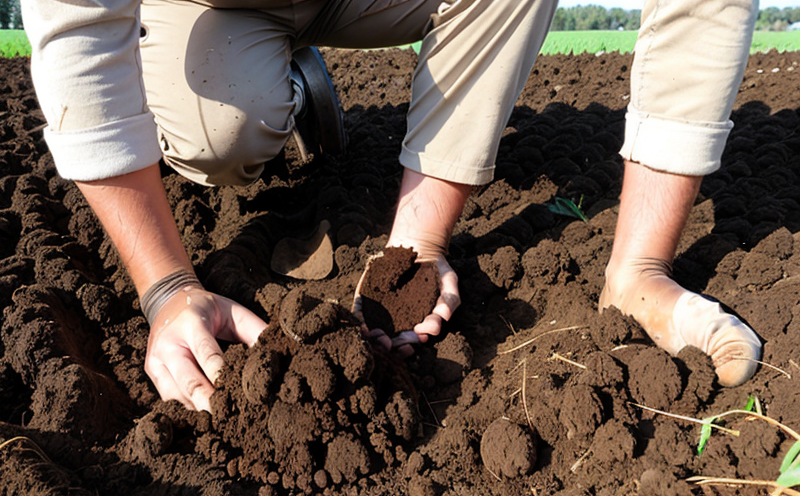Soil Manganese Content Testing
In agriculture and forestry, soil manganese content plays a crucial role in determining the fertility and productivity of the land. Manganese is an essential micronutrient for plants, affecting enzyme systems involved in photosynthesis, respiration, and chlorophyll synthesis. Deficiencies or excesses can lead to significant yield reductions and other plant stress symptoms.
Soil testing for manganese content helps farmers and foresters optimize crop yields by identifying the need for amendments that might correct deficiencies or avoid toxicities. This service supports sustainability and compliance with agricultural best practices, ensuring optimal soil health and crop performance. Understanding the manganese content in soil is especially vital because it interacts synergistically with other essential micronutrients like iron, copper, molybdenum, and zinc.
Our laboratory uses advanced analytical techniques to measure soil manganese content accurately. These methods include atomic absorption spectroscopy (AAS), which provides precise results for trace elements. The testing process involves collecting representative samples from the field or forest floor, ensuring that the samples are free of contamination before analysis. Proper sample preparation is critical, and our experienced staff follows internationally recognized standards such as ISO 17025 to ensure reliability.
Once the samples are prepared, they undergo rigorous testing in our state-of-the-art laboratory equipped with high-resolution analytical instruments. Our technicians analyze the data using statistical methods to provide precise reports that help stakeholders make informed decisions about soil management practices. Reporting includes not only quantitative results but also interpretative comments based on comparison with established benchmarks.
Understanding manganese levels is crucial because it influences plant health and growth rates directly. For instance, insufficient manganese can lead to chlorosis (yellowing leaves), while excessive amounts may cause similar issues but through different mechanisms. By providing accurate soil manganese content data, we assist our clients in creating targeted fertilization programs that enhance crop quality and yield.
The importance of this testing extends beyond agricultural productivity; it also impacts environmental sustainability by promoting efficient use of resources. Farmers and foresters can avoid overapplying nutrients, which reduces pollution risks and conserves natural resources effectively.
Scope and Methodology
| Aspect | Description |
|---|---|
| Sample Collection | Representative soil samples are collected from various points across the field or forest to ensure a comprehensive analysis. |
| Sample Preparation | The collected soil samples undergo thorough drying, sieving, and homogenization before testing. |
| Analytical Methodology | We use atomic absorption spectroscopy (AAS), which is accurate for trace elements like manganese. |
| Quality Control | All analyses are performed under strict quality control protocols as per ISO 17025 standards. |
Benefits
Accurate soil manganese content testing offers numerous advantages to stakeholders in agriculture and forestry. Firstly, it enables precise identification of nutrient deficiencies or excesses, allowing for targeted application of fertilizers. This approach not only maximizes crop yields but also minimizes unnecessary chemical inputs, contributing to sustainable farming practices.
Secondly, by optimizing manganese levels, this testing promotes healthier plant growth, which is critical for enhancing overall farm productivity and resilience against pests and diseases. Additionally, it supports compliance with environmental regulations aimed at reducing agricultural runoff into water bodies, thereby protecting aquatic ecosystems.
For researchers in the field of forestry, understanding soil manganese content helps predict how different management practices affect tree health and growth rates. This information is valuable for developing sustainable forest management strategies that balance economic benefits with ecological considerations.
In summary, our soil manganese content testing service provides actionable insights that contribute to improved agricultural and forestry outcomes, supporting both short-term productivity goals and long-term sustainability objectives.
Competitive Advantage and Market Impact
- Precision: Our use of advanced atomic absorption spectroscopy ensures highly accurate results for trace elements like manganese.
- Compliance: Adherence to ISO 17025 standards guarantees that all tests meet international quality assurance criteria.
- Efficiency: Streamlined sample preparation and rapid turnaround times facilitate timely decision-making by our clients.
- Expertise: Our team of experts in soil science and analytical chemistry provides comprehensive interpretative reports based on analysis results.
Our service has a significant market impact, particularly within the agricultural and forestry sectors where precise nutrient management is key to competitive advantage. By offering reliable testing services, we help our clients stay ahead of industry trends and regulatory requirements, ensuring they maintain sustainable practices that enhance both economic performance and environmental stewardship.





